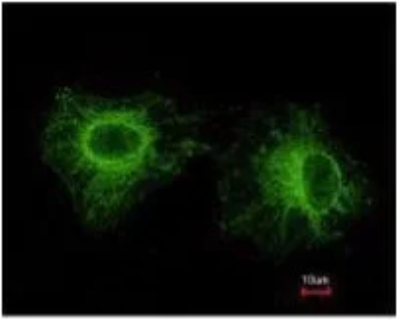
Rabbit Polyclonal MYL1 antibody. Suitable for WB, ICC/IF and reacts with Mouse, Rat, Human samples. Cited in 2 publications. Immunogen corresponding to Recombinant Fragment Protein within Human MYL1.
Activity summary
Fast skeletal Myosin also known as myosin heavy chain II is a motor protein involved in muscle contraction. It has an approximate mass of 220 kDa. Fast skeletal Myosin is expressed primarily in fast-twitch muscle fibers which are found in large quantities in skeletal muscles. These muscles are responsible for rapid and forceful movements. The protein interacts with actin filaments to facilitate contraction through the ATP-dependent sliding filament mechanism.
Biological function summary
Fast skeletal Myosin plays a critical role in the muscle contraction process. The protein forms a part of the myosin filament which together with actin composes the contractile apparatus within muscle fibers. It binds to ATP and hydrolyzes it releasing energy necessary for the movement of actin filaments. This interaction leads to the shortening of muscle fibers enabling muscle contraction and movement.
Fast skeletal Myosin is an integral component of the muscle contraction and energy metabolism pathways. These pathways include the ATP generation and usage cycles essential for energy supply during contraction. Related proteins such as actin and tropomyosin interact with fast skeletal Myosin to regulate the contraction cycle. This regulation ensures proper muscle function coordination and responsiveness.
Fast skeletal Myosin is associated with conditions such as myopathies and muscular dystrophy. These disorders affect muscle fiber function leading to weakness and degeneration. In muscular dystrophy there is often a disruption in the expression or function of related proteins such as dystrophin which can exacerbate the dysfunction of fast skeletal Myosin. Understanding these associations can aid in the development of therapeutic interventions targeting these pathways.
IgG
Polyclonal
Affinity purification Immunogen
Liquid
Recombinant Fragment Protein within Human MYL1. The exact immunogen used to generate this antibody is proprietary information
0.28 mg/mL The concentration of this product may be batch-dependent